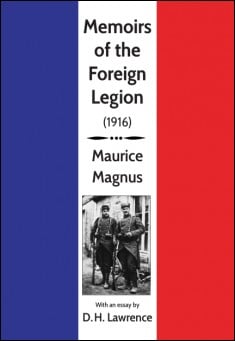Maurice Magnus was 39 years old when he enlisted in the French Foreign Legion to join the fight against Germany in World War I. Magnus was an American expatriot living in Rome, being a theatrical agent, tutor, newspaper correspondent, writer, editor, and literary entrepreneur. Reality soon hit home: the Legion he found consisted largely of German exiles, prison-avoiding felons, and contemptuous French officers. Magnus spent about six weeks training in North Africa before a transfer to southern France provided the opportunity to desert and flee back to Italy. The Memoirs recount his brief disenchanted tenure as a Legionnaire. After his military service his various enterprises had little success, and in 1920 a run of bad checks caused him to skip from Italy to Malta. Traced there eventually by the authorities, he faced extradition for charges of fraud and in desperation committed suicide. His acquaintances Norman Douglas and D. H. Lawrence prepared his Memoirs of the Foreign Legion for publication, hoping to clear the debts he left behind, and Lawrence wrote a long unflattering introduction. In the present volume the Memoirs are printed first, so readers have an unprejudiced experience of the text with Lawrence’s essay following for additional context.
Excerpt:
Soon after Italy joined the war in 1915 I felt I wanted to do something in this great struggle and volunteered for the Red Cross Service; first in Italy, where my application was answered with “only Italians can do service.” I wrote to France, and a very courteous reply came that they were not in need of any one just then, thanked me for my devotion, and would let me know if an occasion for my services presented itself. I wrote to Russia and received an extremely polite answer, in English, that their Red Cross Service was complete and that they had no need of my help. I wrote to Servia and received a curt reply that they had all the help they needed. Soon after receiving the latter, Lady X. in London, at some meeting, called upon those who were capable to volunteer for the Red Cross in Servia, as they were much in need of male and female nurses. I sent her the reply I had received through the Servian Legation in Rome. I did not offer my services to England, as I had heard that no foreigner, including Americans, could serve in the British Army or British Red Cross.
When all these attempts failed I thought of the Foreign Legion, and in the early days of March, 1916, crossed from Naples to Palermo on my way to Tunis and Algiers.
It was a very stormy night when I left Naples — the big State Railway steamers had been taken off and only the smaller ones were in service. The waves were terrific, and several times during the night I thought we had been struck by a submarine. The end seemed to have come, and from one moment to another I quite expected to see the water rushing into my cabin. Nothing happened, and next morning Palermo, with its wonderful Monte Pellegrino, hove into sight.
At this season of the year in normal times Palermo is gay. The approach of spring, the mild sunny days, the Palermotanians and foreigners driving about in carriages and cabs and promenading in the public gardens along the sea front and up and down the Corso and Maqueda, give an air of cheery carelessness to the city. Not so when I was there. Palermo was almost dismal, the streets were deserted, along the Corso and Maqueda only a few hurrying shop people and business men were to be seen. Many hotels were closed up, and the Hôtel des Palmes, where I stopped, was more like barracks — it contained exclusively English officers.
At night all lamp-posts at the sea front had blue glass; even in the streets leading to the sea the lamps had blue glass on the side which looked seaward.
About midnight of the following day I embarked on the Cagliari for Tunis, I had made all my preparations before turning into my berth. My jewels I had sewn into a chamois bag, and my money and necessary papers into an oilcloth bag, and hung both around my neck. I went fully dressed to bed. The only lights in the cabins and saloons were tiny blue electric bulbs, and the porthole shutters were tightly closed. Neither on deck nor on the masts were there any lights.
The next morning when I awoke we were out at sea, but still in sight of land. In fact, we remained in sight of land all day. The sea was rough, and when towards sundown we arrived at Trapani it was almost impossible to embark the passengers who had come out in small boats. Trapani looked very wonderful — the sun shone, but there was a strange white haze over the town which made it look like some white city on the eastern coast of the Crimea. The night was wild — a hurricane was blowing, and the moon, which looked strange and uncannily whitish, lighted up the haze to a radiance.
In the morning we sighted Cape Bon. I was the only first-class passenger, there were some second-class, and very many third class. My ticket was supposed to include meals, but after sighting Cape Bon it appeared no further meals were included, and the chief steward was at liberty to charge for food as he felt inclined, which he did in regular highwayman manner.




